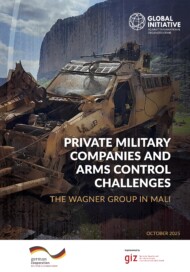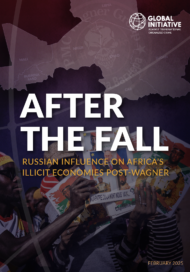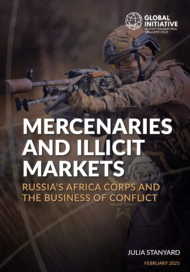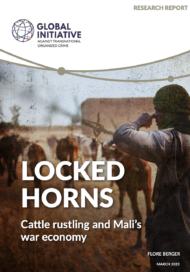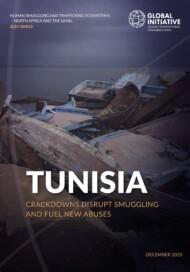Private military companies (PMCs) and mercenary groups have become increasingly visible in conflicts worldwide, raising urgent concerns for human rights and international security. This report documents how weapons and military equipment intended for Mali’s armed forces were rerouted to the Wagner Group between 2021 and 2025, a practice that undermines global arms control regimes and enabled serious human rights abuses.
The UN and the African Union have repeatedly warned about the growing use of mercenaries and PMCs in conflict situations. Key concerns include their involvement in transnational organized crime, human rights violations, and the re-routing of weapons originally intended for a state’s military to mercenary groups. This diversion undermines both international and domestic arms control regimes, which are designed to prevent arms from being used to commit war crimes or fuel instability.
Since the military junta came to power in 2021, Mali’s security and political landscape has shifted dramatically. The junta invited the Wagner Group into the country, severed ties with former security partners, oversaw the withdrawal of French and UN forces, and eventually left Economic Community of West African States (ECOWAS). In this new environment, Wagner emerged as the junta’s ally, playing a central role in combat operations.
Wagner’s presence in Mali was characterized by grave human rights abuses and war crimes, including massacres, torture, rape, and looting. Violence against civilians escalated sharply: civilian casualties per incident doubled between 2021 and 2024.
The Wagner Group did not arrive in Mali with a full arsenal. Instead, it sourced weapons locally through seizures on the battlefield and by taking stock from the Malian Armed Forces (Forces Armées Maliennes, FAMa). From 2023, joint Wagner/FAMa operations declined, and Wagner increasingly operated independently while using FAMa-owned equipment. Evidence presented in this report shows that FAMa’s armoured vehicles, technicals (vehicle-mounted machine guns), and possibly attack drones were rerouted to Wagner. These instances likely breached commitments under the Arms Trade Treaty (ATT), to which Mali and several exporting countries are parties.
In June 2025, Wagner announced its withdrawal from Mali, replaced by the Africa Corps —an entity controlled by the Russian Ministry of Defence that continues to employ many Wagner personnel. Although rebranded, Wagner’s operational model in Mali endures, raising concerns that the rerouting of arms to PMCs may persist.
The study also examines the broader implications of these practices for international arms control. End-user certificates –a cornerstone of the ATT– were undermined when equipment transferred to Mali’s armed forces was used by Wagner. Exporting states, manufacturers, and international organizations now face new challenges in preventing the diversion of arms to PMCs.
This report highlights how Wagner’s operations in Mali represent not only a local security crisis but also a test for global arms control frameworks. Strengthening governance against the diversion of weapons to PMCs is essential for protecting civilian lives and upholding international law.
Sociétés militaires privées et défis pour le contrôle des armements : le groupe Wagner au Mali
Au cours des dernières années, les sociétés militaires privées (SMP) et les groupes de mercenaires sont devenus des acteurs de plus en plus visibles dans les conflits à travers le monde, soulevant des préoccupations majeures en matière de droits humains et de sécurité internationale. Ce rapport documente la manière dont des armes et équipements militaires destinés aux forces armées maliennes ont été détournés au profit du groupe Wagner entre 2021 et 2025 – une pratique qui compromet les régimes internationaux de contrôle des armements et a facilité de graves violations des droits humains.
L’ONU et l’Union africaine ont à plusieurs reprises alerté sur la montée en puissance de l’utilisation de mercenaires et de SMP dans des situations de conflit. Les principales préoccupations portent notamment sur leur implication dans la criminalité organisée transnationale, les violations des droits humains et le réacheminement d’armes initialement destinées aux forces armées d’un État vers des groupes de mercenaires. Ce phénomène mine les régimes de contrôle des armements, qu’ils soient internationaux ou nationaux, conçus pour prévenir l’utilisation d’armes dans la commission de crimes de guerre ou pour alimenter l’instabilité.
Depuis l’arrivée au pouvoir de la junte militaire en 2021, le paysage sécuritaire et politique du Mali s’est profondément transformé. La junte a invité le groupe Wagner dans le pays, rompu ses liens avec ses anciens partenaires sécuritaires, supervisé le retrait des forces françaises et onusiennes, puis quitté la Communauté économique des États de l’Afrique de l’Ouest (CEDEAO). Dans ce nouveau contexte, Wagner s’est imposé comme un allié clé de la junte, jouant un rôle central dans les opérations de combat.
La présence de Wagner au Mali a été marquée par de graves violations des droits humains et crimes de guerre, notamment des massacres, actes de torture, viols et pillages. La violence contre les civils s’est intensifiée de manière spectaculaire : le nombre de victimes civiles par incident a doublé entre 2021 et 2024.
Le groupe Wagner n’est pas arrivé au Mali avec un arsenal complet. Ses armes ont été principalement obtenues localement, soit par des saisies sur le champ de bataille, soit par la récupération de matériel appartenant aux Forces armées maliennes (FAMa). À partir de 2023, les opérations conjointes Wagner/FAMa ont diminué, et Wagner a progressivement opéré de manière autonome tout en utilisant des équipements détenus par les FAMa. Les éléments présentés dans ce rapport indiquent que des véhicules blindés, des technicals (mitrailleuses montées sur véhicules) et, possiblement, des drones d’attaque des FAMa ont été réaffectés à Wagner. Ces détournements constituent probablement des violations des engagements pris dans le cadre du Traité sur le commerce des armes (TCA), auquel le Mali et plusieurs pays exportateurs sont parties.
En juin 2025, Wagner a annoncé son retrait du Mali, remplacé par l’« Africa Corps » – une entité placée sous le contrôle du ministère russe de la Défense, qui emploie une grande partie du personnel de Wagner. Malgré ce changement d’appellation, le modèle opérationnel de Wagner perdure, soulevant des inquiétudes quant à la poursuite de la réaffectation d’armes à des SMP.
L’étude analyse également les implications plus larges de ces pratiques pour les régimes internationaux de contrôle des armements. Les certificats d’utilisateur final –élément central du TCA– ont été contournés lorsque des équipements transférés aux forces armées maliennes ont été utilisés par Wagner. Les États exportateurs, les fabricants et les organisations internationales sont aujourd’hui confrontés à de nouveaux défis pour prévenir le détournement d’armes vers des SMP.
Ce rapport montre que les activités de Wagner au Mali ne constituent pas seulement une crise sécuritaire locale, mais représentent également une épreuve pour les cadres mondiaux de contrôle des armements. Le renforcement des mécanismes de gouvernance visant à prévenir le détournement d’armes vers les SMP est essentiel pour protéger les populations civiles et faire respecter le droit international.
